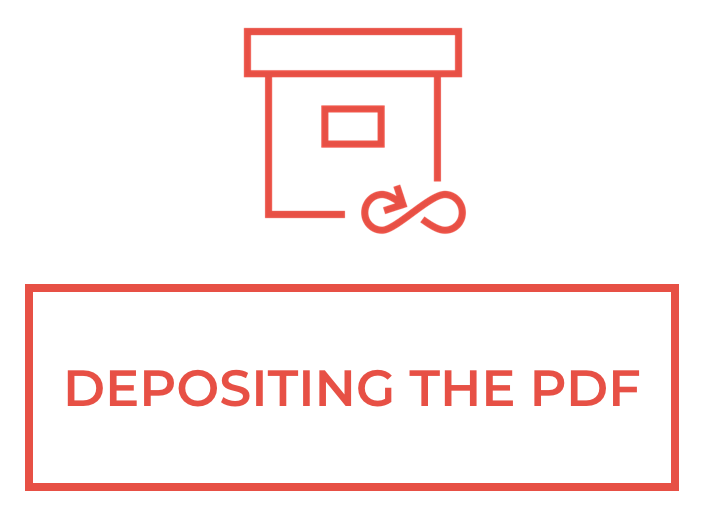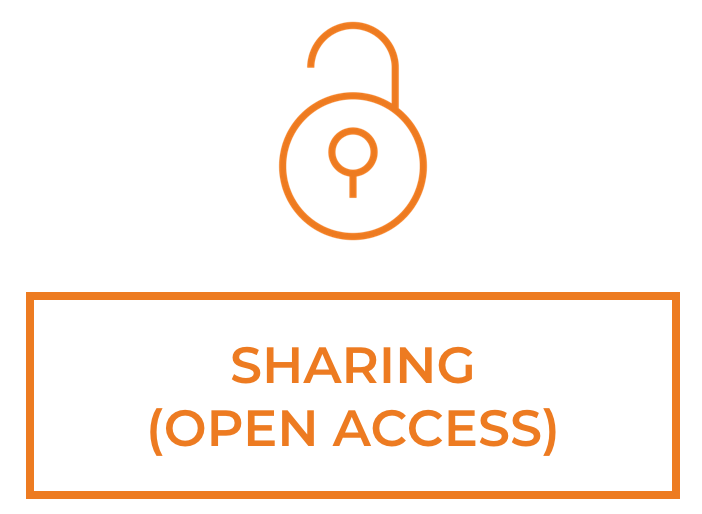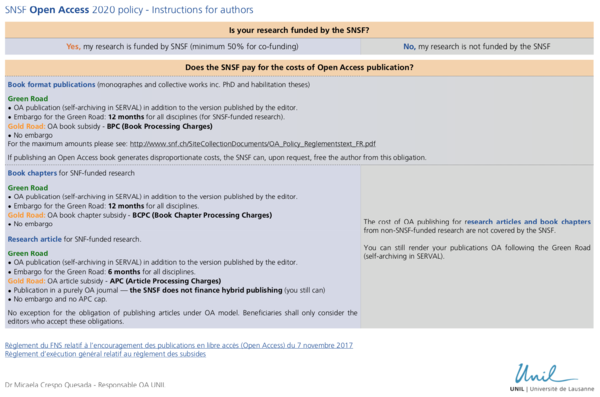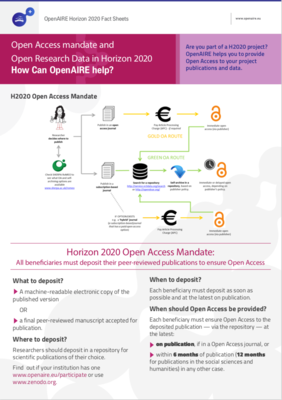2. External Open Access policies
- UNIL's Open Access Directive (SERVAL)
- Open Access policies in Switzerland
- Open Access policies in Europe
UNIL's Open Access Directive (SERVAL)
The Directive
Full text
The full text of Directive 4.6 (FR) can be found here.
Context
UNIL's mission is, among others, to transmit knowledge and develop science through teaching and research, as well as to foster the development of intellectual life and the dissemination of culture. Through the research it conducts, UNIL contributes to the development, progress and prosperity of the community, and is responsible for safekeeping the scientific heritage that it generates.
In line with this, UNIL supports and promotes the principle of Open Access to scientific knowledge particularly through the use of its institutional repository, SERVAL.
What and who does it apply to?
Compulsory
To all members of the UNIL community who are authors of a scientific publication. For the purposes of this Directive, a scientific publication is either an article or a book extrait, provided that they have been divulged.
Highly recommended, but left to the discretion of authors (who will decide whether depositing and sharing is feasible based on possible copyright restrictions).
Any other form of scientific publication, such as books in their entirety, doctoral theses, monographs, presentations, posters and conference proceedings, research reports, technical reports and working papers, master's theses, privat-docent theses and press articles.
Complying with the Directive in three steps
Creating a record
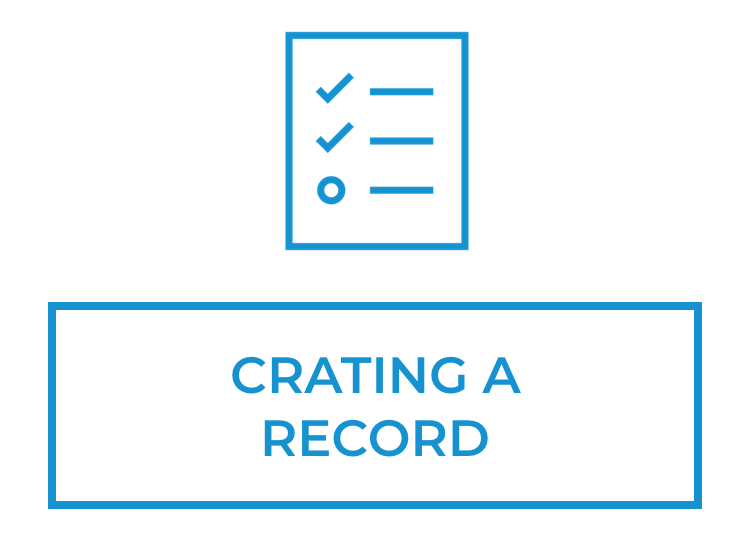 This step is mandatory and must be completed no later than at the time of publication.
This step is mandatory and must be completed no later than at the time of publication.
- All authors must create a record in SERVAL containing the bilbiometric data of the publication (metadata).
- The record must be linked to all UNIL/CHUV co-authors.
- The record must be linked to the UNIL/CHUV units where the research leading to the publication was performed (these may be different from those to which the authors are attached at the time the record is created).
How to create a record for a publication with DOI/PMID.
How to create a record for a publication that does not have a DOI/PMID.
Depositing the PDF
This step is mandatory and must be completed no later than at the time of publication.
- All authors must include in each record a version of the publication (PDF) in question, providing it exists in digital format.
- The version of the document, as well as any access restrictions, are determined by the copyright holder (most often the Publisher).
- Authors are required to deposit the version of the publication that is most widely available. If necessary, this may be the author accepted version before the publisher's final layout (postprint).
Sharing the publication (Open Access)
UNIL strongly recommends authors to complete this step as soon as possible in accordance with the principles set out in the Swiss National Strategy on Open Access of swissuniversities.
- Authors benefiting from external research funding will primarily comply with the Open Access rules of said organization, if they exist.
- All forms of Open Access are accepted (including Hybrid Access, provided it is covered by a transformative Read & Publish agreement).
- As far as the Green road is concerned, the author is required to deposit the most widely shareable version of the manuscript of the publication and to negotiate with the publisher (if necessary) the shortest possible embargo period.
- Sharing the publication in academic social networks (ResearchGate, Academia, etc.) as well as personal or project websites is not considered an Open Access dissemination modality (although it a link leading to the deposited PDF in SERVAL can be shared in those platforms).
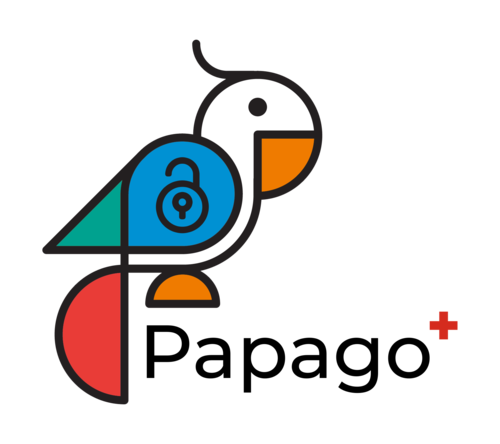 Got any doubts concerning your rights and obligations regarding Open Access publishing for one of your articles? Ask Papago, your Open Access personal assistant!
Got any doubts concerning your rights and obligations regarding Open Access publishing for one of your articles? Ask Papago, your Open Access personal assistant!
Open Access policies in Switzerland
Swiss National Open Access Strategy
In December 2015, the State Secretariat for Education, Research and Innovation (SERI) commissioned swissuniversities to elaborate, with the support of the Swiss National Science Foundation, a national strategy for Open Access to publications.
The Swiss National Strategy on Open Access was adopted on 31 January 2017.
It aims to achieve the following objective in accordance with international benchmarks: by 2024, all scholarly publication activity in Switzerland should be OA, all scholarly publications funded by public money must be freely accessible on the internet. The OA landscape will consist of a mix of OA models (Green and Gold Open Access).
The National Open Access Strategy can be found here and the action plan proposed to achieve the objectives can be downloaded here .
Swiss National Science Foundation (SNSF)
The National Open Access Strategy approved in spring 2017 and the Action Plan of February 2018 represent important steps in establishing Open Access in Switzerland. They aim to ensure that all publications financed with public money are openly accessible by 2024.
The SNSF has decided to implement Open Access for all publications emanating from SNSF-funded research already as of 2020.
To facilitate this policy, the SNSF has defined a range of measures and issued new regulations, which entered into force on 1 April 2018. These measures focus on the funding of Gold Open Access publication costs (for articles, books and chapters) independently from projects budgets through the introduction of a new Open Access Platform.
Nonetheless, Green Open Access is also compliant with the SNSF's Open Access mandate as long as the embargo period is no longer than 6 monts for articles, and 12 months for books and book chapters.
The SNSF DOES NOT fund hybrid Open Access, although authors are free to use that way.
The regulations on the funding of Open Access publications can be found here (FR). A shorter fact-sheet by the SNSF will be available soon. In the meantime, UNIL provides its researchers with the summary table below:
Open Access policies in Europe
Horizon Europe
Open science is an approach based on open cooperative work and systematic sharing of knowledge and tools as early and widely as possible in the process. It has the potential to increase the quality and efficiency of research and accelerate the advancement of knowledge and innovation by sharing results, making them more reusable and improving their reproducibility. It entails the involvement of all relevant knowledge actors.
Horizon Europe moves beyond open access to open science for which it features a comprehensive policy implemented from the proposal stage to project reporting.
More information (Chapter 16 )
H2020
Modern research builds on extensive scientific dialogue and advances by improving earlier work. The Europe 2020 strategy for a smart, sustainable and inclusive economy underlines the central role of knowledge and innovation in generating growth. Broader access to scientific publications and data therefore helps to build on previous research results, encourage collaboration and avoid duplication of effort, speed up innovation and involve citizens and society.
This is why the EU wants to improve access to scientific information and to boost the benefits of public investment in research funded under Horizon 2020.
The Commission considers that there should be no need to pay for information funded from the public purse each time it is accessed or used. Moreover, it should benefit European businesses and the public to the full. This means making publicly-funded scientific information available online, at no extra cost, to European researchers, innovative industries and the public, while ensuring that it is preserved in the long term.
Under Horizon 2020, the legal basis for open access is laid down in the Framework Programme and its Rules for Participation. You can find the Guidelines to the Rules on Open Access to Scientific Publications and Open Access to Research Data in Horizon 2020 here .

